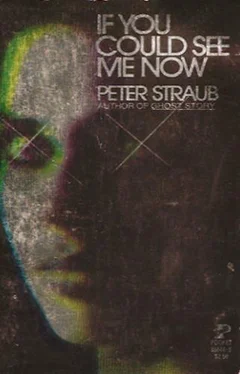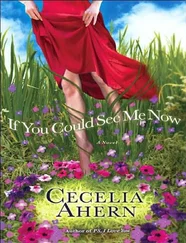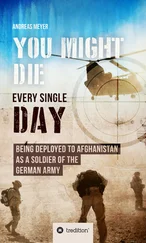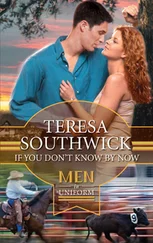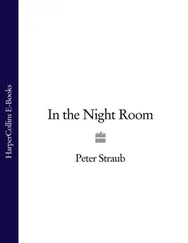I thought of calling for Alison Updahl’s help, but decided not to. It had been a morning of mistakes, and I did not wish to commit another and upset the delicate peace between us. So I took the trestles up first and put them on the grass outside Duane’s back door, and then went back down for what would be my desktop.
The long heavy wooden rectangle was far more awkward to handle, but I managed to get it up the stairs without knocking down a shotgun or dislodging an ax or shattering the old cello-hipped Coke bottles. After I had muscled it up the steep wooden steps, I was sorry I had not called for Alison’s help, for my chest leapt and pounded as though a trout were dying in it. My torn hand ached. I slid the door across the linoleum crumpling several small hooked rugs, and then banged the screen door open with my elbow and wrestled the door outside and down the concrete steps. I was sweating and breathing hard. Mopping my forehead with my sleeve, I propped the door against the trestles and looked at it in dismay. Spider webs, dust and insects made scurrying lacy patterns over the white paint.
The solution, a garden hose, lay at my feet. I twisted the knob set into the base of the house and played the hose over the door until all the filth had been sluiced away. I was tempted to run it over myself. My hands were black and my shirt was ruined, and sweat poured out of my scalp. But I merely held my hands one after the other in the jet of cold water, wetting the bandage as little as possible. Application of magical substance.
Cold water!
I dropped the still-spurting hose and went across Duane’s patchy lawn in the direction of the barn. When I looked to the right I could see my cousin’s head and upper body grinding along atop the invisible tractor, as if he were floated by a perverse, bumpy wind. I went over the gravel and dust of the drive. The dog began to curse me with big windy arrogant curses. I reached the tank and plunged my good hand into the greenish water and closed it over a beer bottle to which clung my bloody handkerchief. This I threw into the weeds. I extracted the dripping bottle. I had just twisted off the cap and begun to pour into me the tingling liquid when I saw the blond-fringed face of the Tin Woodsman staring at me from the kitchen window. She winked. Suddenly we were grinning at each other, and I felt the snarl of emotion which the day had caused in me begin to loosen. It was as though I had found an ally. Really, it could not have been easy for a high-spirited girl to have my cousin Duane for a father.
After I had stripped it of the knobs and set it up in the empty upstairs bedroom of my grandmother’s house, the desk looked sturdy and serviceable, a present-day echo of all the desks I have known and used. The room itself, small, white and pine-floored, was a perfect place for literary work, since the bare: walls offered vistas for contemplation and the single window which faced the barn and the path to Duane’s house, opportunity for distraction. Soon I had all my paraphernalia arranged on the desk — typewriter, paper, notes, the beginning-of my draft and my outline. Typex, pens, pencils, paperclips. The novels I placed in several neat piles beside the chair. For a moment I felt that spirit lay in labor in hard work, the more recondite and irrelevant the better. My dogged dissertation would be my linkage with Alison Greening; my work would summon her.
But that day I did no work. I sat at my desk and looked out of the window, watching my cousin’s daughter cross and recross the grass and the path as she-went to the equipment shed or down to the barn, glancing curiously at my window, and then watching Duane ride up from the road on his giant tractor. He put it in the polebarn and then lumbered back across to his house, scratching himself on the bottom. I felt — I suppose I felt — lonely and elated, primed for an event and still flat and hollow at the same time, as though I were not what I was pretending to be, but were merely an actor waiting for the role to begin. It is a feeling I often have.
I sat there watching the sky darken over the barn as the path lost its definition and the tops of Duane’s house and the barn first stood out with greater clarity against a background of darkening blue and then were absorbed into the sky, as if bites were taken out of them. Lights appeared in Duane’s house in series, each window lighting up as though it were timed to go on a moment after its neighbor. I thought Alison might appear on the path, her T shirt shining in moonlight as she sulkily walked toward me, the lank ends of her hair swinging in rhythm with her heavy thighs. After a time I fell asleep. I could have been out no more than an hour, but when I opened my eyes only one light was on in Duane’s house and the territory between our two dwellings seemed as dark and pathless as a jungle. Hungry, I groped my way downstairs and into the kitchen. The house was clammy and musty, and everything was cold to my touch. When I opened the refrigerator I found that either Duane or Mrs. Sunderson had stocked it with, enough food for that night and the following morning — butter, bread, eggs, potatoes, two lamb chops, cheese. I fried the chops and wolfed them down with slices of bread and butter. A meal without wine is not a meal for a grown man. I gnawed at the block of cheddar for dessert. Then I dumped the dishes in the sink for the cleaning woman and went burping back upstairs to the bedroom. When I looked in at my workroom I saw a single light still on in Duane’s house, but at its far end. Alison’s bedroom, presumably. As I stood looking at it I heard the buzz of a motorcycle going up the road. It increased in volume until it came about level with my position and then it abruptly shut off. My desk looked malevolent, like the fat black center of a spider web.
My bedroom, of course, had been my grandmother’s. Yet I see that it is not of course, for she had moved to the chillier, smaller bedroom upstairs only after the death of my grandfather; for this reason it had a newer bed, and for that reason I chose it. It was as far as you could get from the old bedroom and still be in the house — on the opposite side and up the narrow stairs. My grandfather had died when I was a small child, so all my memories of my grandmother are of her as a widow, a wrinkled old woman who climbed the narrow stairs to go to bed. As some old women do, she swung in size between extremes of heaviness and thinness, alternating every three or years, and finally settled on being thin, and died like that. Given that the narrow little room had this history, it is unsurprising that I had a dream about my grandmother; but I found the emotional violence of the dream shocking.
I was in the sitting room, which was furnished not with Duane’s office contraptions but in the old way. My grandmother was seated on her wooden-backed sofa, nervously looking at her hands. — Why did you have to come back?
— What?
— You’re a fool.
— I don’t understand.
— Haven’t enough people died already?
Then she abruptly stood up and walked out of the room onto the porch, where she sat in the rusty old swing. — Miles, you’re an innocent. She raised her fists to me and her face contorted in a way I had never seen. — Fool, fool, fool! Fool innocent!
I sat beside her. She began to beat me around my head and shoulders, and I bent my neck to receive her blows. I wished for death.
She said — You put it in motion and it will destroy you.
All the life went out of me, and the setting receded until I was suspended in a blue fluid, far away. The distance was important. I was in a far blue drifting place, still weeping. Then I understood that it was death. Distant conversation, distant laughter filtered to me, as though through walls. When I became aware of other bodies floating as mine was, hundreds of them, thousands of bodies spinning as if from trees in that blue horror, I heard the sound of loud handclaps. Three of them. Three widely spaced loud claps, unutterably cynical. That was the sound of death, and it held no dignity. It was the end of a poor performance.
Читать дальше
